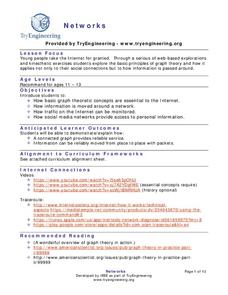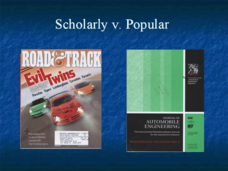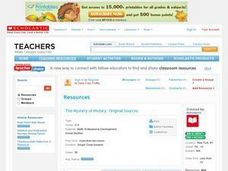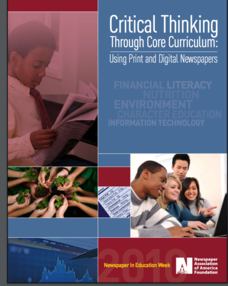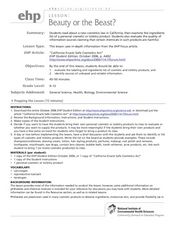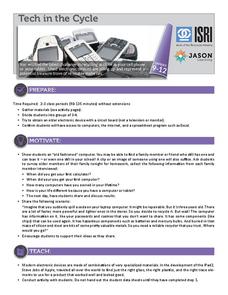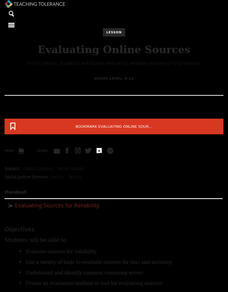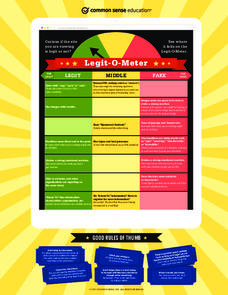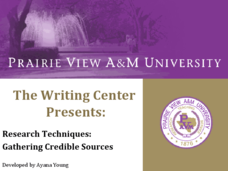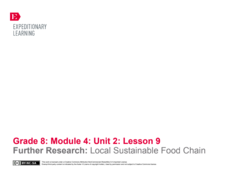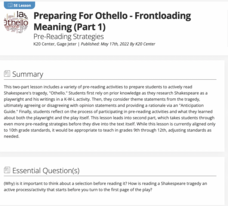Advocates for Human Rights
Nativism and Myths about Immigrants
Where do anti-immigrants myths come from, and how can they be refuted? Learners critically analyze media reports and how to identify reliable sources. After studying a timeline that details the history of US nativism, groups research the...
Curated OER
How to Locate and Evaluate Information, Part I - Online Catalog
Using the online catalog, researchers locate and record on a citation template specific sources for their research paper. A library specialist models searching strategies while the teacher introduces the research paper process. Daily...
TryEngineering
Networks
Ever wonder how the Internet works? The lesson teaches scholars the basics of graph theory and how it applies to the Internet. They perform simulations to see how information is sent on the Internet.
Curated OER
Scholarly v. Popular (Journals)
How do you determine whether a resource is credible or not? Contrary to what your class probably believes, just because it's published doesn't mean it provides accurate information! So how does one determine if it's credible? Use this...
Newseum
Evidence: Do the Facts Hold Up?
Sometimes it's hard to escape bad information! Pupils learn the E.S.C.A.P.E. method for evaluating news sources and complete a worksheet to assess a news article using their new skills.
Newseum
Slanted Facts and Slippery Numbers
The Internet is known as the information superhighway, but sometimes it's hard to know when to hit the brakes on unreliable sources. Using a well-rounded lesson plan, pupils read and summarize articles about the gender pay gap and...
Curated OER
The Mystery of History-Original Sources
Students research the events surrounding the Alamo in 1863, and explore the differences between primary and secondary sources of information. They brainstorm lists of items used to research a subject and categorize them as primary or...
Pulitzer Center
The Paradise Papers: A Lesson in Investigative Journalism
The Paradise Papers, a year-long research project from the International Consortium of Investigative Journalism (ICIJ) exposed how political leaders, business people, and wealthy individuals used offshore entities to avoid taxes and hide...
American Press Institute
Media Literacy: Where News Comes From
What actually happens at a press conference? Make sense of the mayhem with a mock press conference activity designed to promote media literacy. Individuals participate as either members of the press or the governor's office to examine...
Newspaper Association of America
Critical Thinking through Core Curriculum: Using Print and Digital Newspapers
What is and what will be the role of newspapers in the future? Keeping this essential question in mind, class members use print, electronic, and/or web editions of newspapers, to investigate topics that include financial literary,...
Curated OER
Beauty or the Beast
Does the FDA really intend to protect public health? Spark a debate in your chemistry or health class by using this article, titled "Beauty or the Beast." It questions the safety of cosmetics and toiletry products, govenment regulations,...
Baylor College
Body Mass Index (BMI)
How do you calculate your Body Mass Index, and why is this information a valuable indicator of health? Class members discover not only what BMI is and practice calculating it using the height and weight of six fictitious individuals, but...
Jason Learning
Tech in the Cycle
It might not be easy, but it is worth recycling electronics. Small groups determine the percentage of the materials that make up an iPad 2 and display the information in a circle graph. They then research the recycling process for...
Federal Reserve Bank
Credit Cards - A Package Deal
Arm your learners with the information they will need to make smart decisions regarding credit cards and personal savings.
Teaching Tolerance
Evaluating Online Sources
Newspapers, television, social media ... how do people get their news? Using the informative resource, scholars locate and verify credible sources of information. Working in small groups, they discuss strategies for evaluating the...
Common Sense Media
Legit-O-Meter
Pop-ups, banner ads, grammar mistakes ... these are all signs of an untrustworthy website. With the handy Legit-O-Meter poster, scholars can now double-check their sources to ensure accurate, reliable information. The color-coded poster...
ProCon
Illegal Immigration
Should immigrants who illegally reside in the United States be eligible for citizenship? With information about undocumented immigrant population estimates, sanctuary cities, and unaccompanied immigrant children, pupils consider the pros...
Teaching Tolerance
Understanding and Evaluating Online Searches
With billions of options to choose from, how can people determine which online sources are reliable? Using an informative resource, pupils first discuss and evaluate a sample search result handout. Next, partners create a checklist for...
Curated OER
Thinking About Hate
This lesson starts out with a guided discussion about the statement "Birds fly in the sky; airplanes fly in the sky; therefore, airplanes are birds" and goes on to cover logical fallacies and reliable sources, relating these to the topic...
Curated OER
Research Techniques: Gathering Credible Sources
How can you spot a credible source? What even makes a resource reliable in the first place? Answer some of these questions with this presentation. Although intended for higher education, this PowerPoint could be modified for middle...
Curated OER
How to Locate and Evaluate Information, Part III - Internet Sites
This is the third in a series of lessons scaffolding the research paper. It purports to teach researchers how to evaluate internet sites, but the lack of links, specific criteria, or site evaluation rubrics would require additional...
Stanford University
Great Plains Homesteaders
"Westward, ho!" may have been their cry in spite of the hardships. Using a series of photographs by Solomon D. Butcher of those who ventured west, class members consider what life was like in the 1800s for those who embarked on the...
EngageNY
Further Research: Local Sustainable Food Chain
Researchers review how to create citations, find reliable sources, and paraphrase. Next, using guided task cards and their researcher's notebooks, they investigate the question they developed in instructional activity eight about the...
K20 LEARN
Preparing for Othello - Frontloading Meaning (Part 1): Pre-reading Strategies
The success of any lesson plan based on a complex text relies heavily on what instructors do before beginning the reading. Before reading Othello, scholars engage in a series of pre-reading activities, including completing an...




